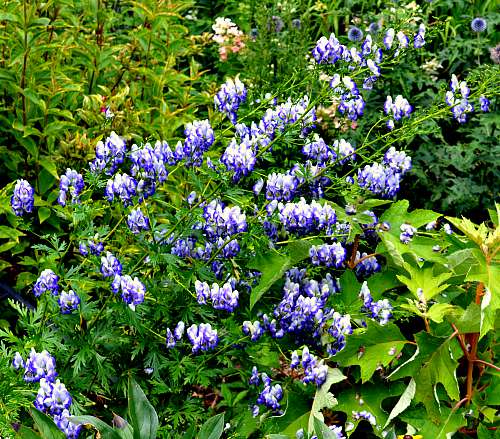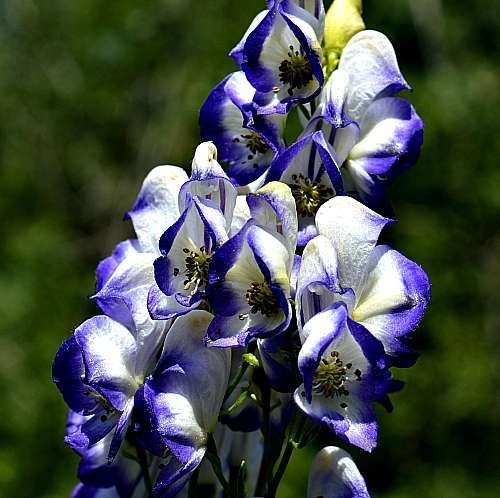Plant of the Month for October, 2015
(a-kon-EYE-tum KAM-mar-um)
General Information:
Aconitum x cammarum ‘Bicolor’ is a special summer blooming monkshood. In zone 5, it blooms mid to late August at a time when other plants are slowing down. It can grow in full sun or heavy shade making it ideal for almost any garden.

Aconitum x cammarum ‘Bicolor’; photo by Robert Pavlis
In full sun the plant is stockier and the spacing between flowers is smaller. In shade, the stems are weaker, taller, and the spaces between flowers enlarge. It is best staked in both locations, but definitely in shade. Its bright blue/white coloration is great in a shady spot.
It is a long lived perennial, but there are some reports of it mysterily dying out. One of my plants had grown well for several years and this year is almost non-existent.

Aconitum x cammarum ‘Bicolor’; photo by Robert Pavlis
The plant is reported to be extremely poisonous with some people even warning that you should use gloves when handling it. Most of this is highly exaggerated. Aconitums do contain the alkaloids aconite and aconitine, which are poisonous. However, there have been very few reports of death from these plants, and all of them seem to be the result of eating the plant or its extracts. Touching the plant will not kill you. The poison is found in higher concentrations in the roots and the seeds.
Other common names include, devil’s helmet, monkshood, and wolf’s bane. The latter name refers to the historical use of plant extracts to kill wolves by poisoned arrows. Aconitum x cammarum is a primary hybrid between A. napellus and A. variegatum.
Life Cycle: perennial
Height: 120 cm (4 ft)
Bloom Time: mid to late summer
Natural Range: garden origin
Habitat: n/a
Synonyms: Aconitum carmichaelii ‘Bicolor’, Aconitum napellus ‘Bicolor’
Cultivation:
Light: full sun to full shade
Soil: moist, well drained
Water: regular moisture
USDA Hardiness Zone: 3– 7
Propagation: division
Seedex availability (ORG&HPS annual Seed Exchange): occasionally
